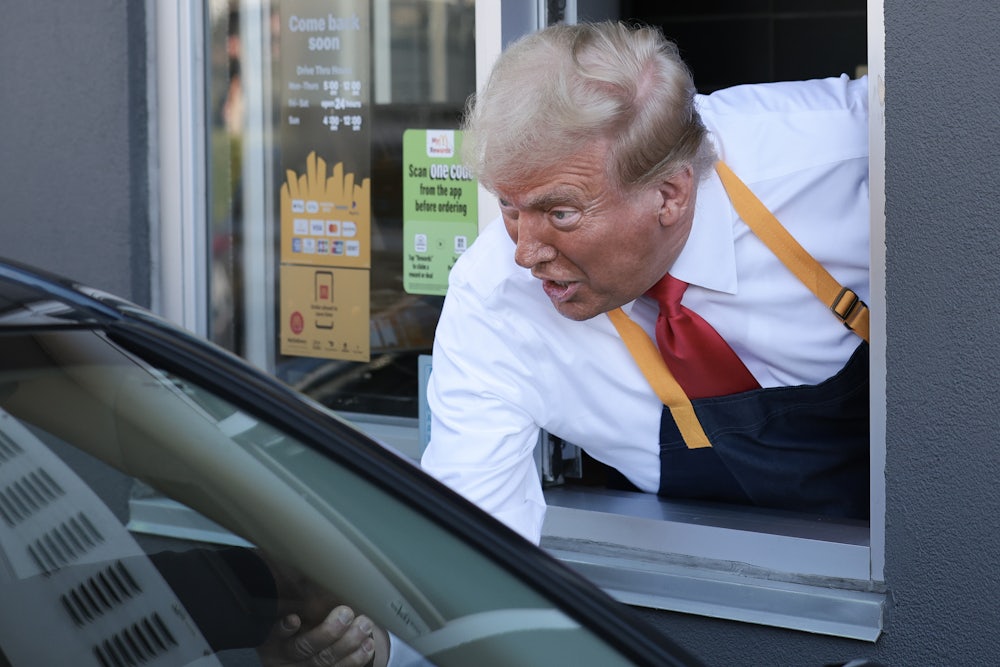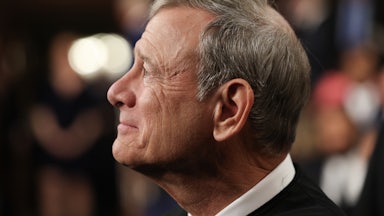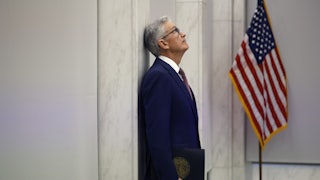As she delivers her closing argument in the final week-plus of the presidential campaign, Vice President Kamala Harris is increasingly centering her pitch around a warning: Donald Trump is not just a danger to the country, but a “fascist.”
The shift in tone comes as a reaction to two alarming recent stories. In three interviews with The New York Times published Tuesday, former Trump chief of staff John Kelly said that the former president “certainly falls into the general definition of fascist.” The same day, The Atlantic revealed that Trump had said that he needed “the kinds of generals Hitler had” to unquestionably follow his orders.
Harris picked up what Kelly put down. On Wednesday, she said these reports were “further evidence for the American people of who Donald Trump really is.… We know what Donald Trump wants. He wants unchecked power.” Later that day, when asked if she thought Trump was a “fascist” during a CNN town hall, Harris said that she did. On Thursday, the Democratic National Committee announced it had paid for a billboard with Trump’s quote about Nazi generals to go up outside the location of one of his upcoming rallies.
The tonal shift is not surprising. For one thing, it mirrors closing arguments made by Hillary Clinton and Joe Biden in 2016 and 2020, respectively, about the risk Trump posed to democracy. For another, a former chief of staff calling their ex-boss a “fascist” is a big deal, and speaking admiringly of Hitler—as Trump reportedly has on several occasions—is generally something most people disapprove of. Most important, Trump really is a threat to democracy, and he makes no secret of what he hopes to do if he returns to the White House: deport millions, politicize and weaponize the federal bureaucracy against his “enemies within,” and trample over every guardrail that could check his power.
As closing arguments go, it’s … fine. It worked in 2020, and may well again. But it also feels oddly thin. While Trump is truly an authoritarian, the threat he poses isn’t just to democracy. His fascism will have a material and destructive effect on people’s lives. It’s not enough to just call him a “fascist”—or even to just point to his praise for Hitler and other dictators. It’s incumbent on Harris and her running mate, Tim Walz, to explain what that would mean for voters themselves.
Writing in his newsletter earlier this month, veteran Democratic strategist and pollster Michael Podhorzer argued that Harris’s campaign was struggling in part because voters were underrating the threat of Trump’s reelection. Four years ago, Podhorzer wrote, “Biden won the key Electoral College states because enough of those who were not enthusiastic about voting for Biden were sufficiently motivated by the prospects of a second Trump term to vote against Trump.” Currently, however, “evidence suggests that many of these same voters are less alarmed than they could be about the consequences of a second Trump term.”
Harris’s argument that Trump is a fascist is aimed at reaching these voters. Her embrace of Trump’s Republican critics, notably her many appearances with former GOP Representative Liz Cheney, is best understood as a way of legitimating it. Voters might shrug off Democratic warnings as electioneering, but, according to this line of reasoning, they are more genuine coming from Republicans.
It is not clear that this approach has actually worked. The race has barely moved since Harris started barnstorming with the deeply unpopular Cheney—indeed, it seems to have moved toward Trump during that period. And there are few Republican surrogates left. Kelly’s comments are alarming, but he is not expected to appear at campaign rallies. George W. Bush and Mitt Romney are not expected to endorse Harris, let alone stump for her. (Bush’s endorsement, particularly given Harris’s ongoing struggles with Arab Americans, could even do more harm than good.)
Harris’s problem isn’t just that voters are underrating the risk of a second Trump presidency, but that many view his disastrous first term with rose-tinted glasses. Trump has paid little to no price for his horrific mismanagement of the Covid-19 pandemic, and high inflation has made voters look back fondly on the comparable prosperity of 2017–19. Trump and his surrogates, particularly running mate JD Vance, have made the same case again and again: The Biden era has been one of high prices, global conflict, and unease; the Trump era wasn’t; and reelecting Trump will stabilize the world and the economy.
This is wrong. Trump inherited a strong economy—and did everything he could to sabotage it, both by passing a ridiculous, unnecessary tax cut for corporations and the wealthy and by very nearly stumbling into conflicts in Iran and North Korea that, unlike the ongoing ones in Ukraine and the Middle East, would have directly involved the United States. The day-to-day life of the Trump presidency was one of grinding anxiety and chaos—not stability and economic growth.
Harris is right to stress the larger, existential risks of Trump’s return to office, as she does when she says that a second term in office “would be worse” because “there would be no one to stop his worst instincts. No guardrails.” But that message can and should be extended further. Trump’s fascism would have direct material consequences for Americans. His tirades, whether on social media or on the world stage, move markets; they destroy faith in the country as an economic power. His return to office would empower craven billionaires like Elon Musk to run and remake large sections of the economy in their own interest. Harris can undercut Trump’s populism by reminding voters that he is, in fact, a plutocrat running in service of other plutocrats. His threat to democracy isn’t just constitutional. It would involve handing the reins of government over to a small cabal of terrible people.
Trump’s authoritarianism would make day-to-day life worse in myriad ways. His embrace of tariffs would cause gargantuan price hikes while doing nothing to strengthen American manufacturing. Indeed, his embrace of trade war as the be-all and end-all of economic policymaking would likely thank the economy. (His claim that these tariffs would enrich the nation beyond anything it has seen before is ridiculous on its face; if a country is raking in money from tariffs, then those tariffs are not working by definition.) The most authoritarian aspect of his second-term agenda—his promise to deport millions, and perhaps tens of millions, of undocumented immigrants at a cost of hundreds of billions in taxpayer money—would similarly cause economic ruin by decimating entire industries. If enacted, it would lead to moral and financial catastrophe.
Unfortunately, Harris has painted herself into a corner on this issue by pushing a remarkably conservative immigration platform. In 2018, Democrats ran successfully in the midterm elections by arguing that Trump’s hard-right immigration policies, which included separating children from their parents at the southern border, were immoral and despicable. While Harris occasionally reminds voters of that particularly ghastly policy, she has conspicuously avoided attacking Trump’s mass-deportation plan. Instead of celebrating our “nation of immigrants” or even simply noting the economic necessity of immigration, she only talks about her experience prosecuting criminal cartels and the need to “secure the border.” By doing so, Slate’s Henry Grabar wrote on Friday, Harris “has missed a chance to reframe the debate, raising the alarm about Trump’s plans and reminding voters of the suffering he inflicted the first time around. This poll-driven politics is cowardly, but it’s also counterproductive: You can’t win an argument you don’t have.”
It is likely too late to convince Harris to make that case. But she can still expand the argument that she is making. Yes, Trump is a fascist. But what does that actually look like in practice? Harris has two weeks to paint that picture for voters.






